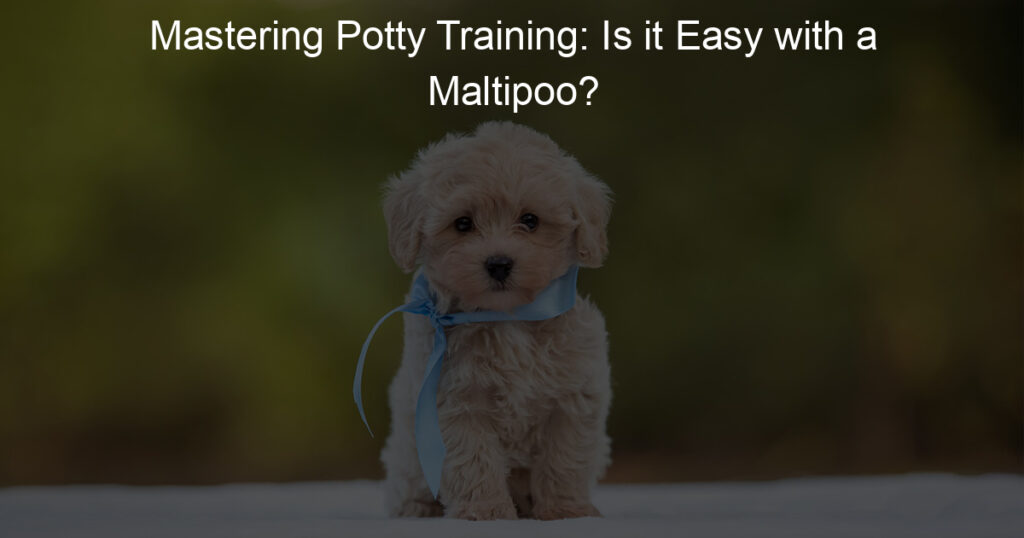Introduction: Do Maltipoo Dogs Bark a Lot?
This is a valid concern, as excessive barking can be disruptive and stressful. In this article, we will delve into the Maltipoo breed, their barking habits, and some common misconceptions about their behavior.
-
- The Maltipoo breed
A crossbreed between a Maltese and a Poodle. Known for their friendly and affectionate nature, Maltipoos make great companions. They are intelligent, which makes them highly trainable. Like any breed, they have their unique traits and behaviors, including their barking habits.
-
- Common misconceptions about Maltipoo barking
They are incessant barkers, while they can be vocal, barking is a form of communication for dogs. It’s their way of expressing a variety of emotions and needs. Barking doesn’t necessarily mean they are problematic or poorly trained. It could be a sign that they are bored, anxious, or simply trying to alert you to something.
Maltipoo Barking: The Behavior
Why Do Maltipoo Dogs Bark?
-
- Communication
Like all dogs, use barking as a form of communication. They might bark when they’re excited, want attention, or need something from you. It’s their way of ‘talking’ to you. The different types of barks can help you better understand what your Maltipoo is trying to communicate.
-
- Separation Anxiety
Are known for their affectionate nature and strong attachment to their owners. This can sometimes lead to separation anxiety when they’re left alone. Barking in this case is a distress signal, showing that your Maltipoo is uncomfortable with your absence.
-
- Response to Strangers
Be wary of strangers, if someone unfamiliar approaches. They may bark as a way of alerting you or as a defensive response. This is a natural instinct and part of their protective nature.
Do Maltipoos Have Separation Anxiety?
-
- Signs of separation anxiety in Maltipoos
There are several signs that they may be suffering from separation anxiety. These include excessive barking or howling when left alone, destructive behavior like chewing or scratching at doors and windows, and attempts to escape from where they’ve been confined. They may also show signs of depression or restlessness, and in some cases, they may even have accidents in the house despite being house trained.
-
- Case study: Dealing with a Maltipoo’s separation anxiety
Consider the case of Bella, a two-year-old Maltipoo. Bella’s owner noticed that she would become extremely anxious whenever she was left alone, often resulting in destructive behavior. After consulting with a professional dog trainer, Bella’s owner implemented several strategies to help manage her separation anxiety.
Firstly, Bella’s owner started leaving her alone for short periods of time, gradually increasing the duration. This helped Bella get used to being alone without feeling abandoned. Secondly, Bella’s owner made sure to provide plenty of physical and mental stimulation when they were home, including walks, playtime, and puzzle toys. Finally, Bella’s owner used positive reinforcement to reward calm behavior when they were about to leave the house.
With patience and consistency, Bella’s separation anxiety improved significantly. This case study shows that with the right approach, it’s possible to manage a Maltipoo’s separation anxiety effectively.
Maltipoo Barking at Strangers
-
- Why Maltipoos may bark at strangers
Dog breeds, are naturally protective of their owners. When they encounter strangers, their instinct is to alert their owners of the potential threat. This is often why they bark at unfamiliar faces. Known for their high energy levels and curiosity, which can also trigger barking when they meet new people.
Another reason could be fear or anxiety. If they hasn’t been properly socialized, they may feel uncomfortable around strangers and express their fear through barking. Expose your them to different environments and people from a young age.
-
- Training your Maltipoo to stop barking at strangers
-
- Socialization: Expose to different people, environments, and situations. This will help them become more comfortable around strangers and reduce their tendency to bark.
- Positive reinforcement: Reward when they behave well around strangers. This could be in the form of treats, praise, or petting. Over time, they will associate good behavior with rewards and will be less likely to bark.
- Distraction: If they starts barking at a stranger, distract them with a toy or a command. Once they are focused on something else, they will likely stop barking.
- Professional training: If you’re struggling to train them on your own, consider seeking help from a professional dog trainer. They can provide you with more specific strategies and techniques.
Do Maltipoo Bite?
-
- The Maltipoo biting behavior
Puppies often bite as a form of play or to explore their surroundings. They may also bite when they are teething, as it helps to relieve the discomfort. Adult may bite due to fear, anxiety, or to protect their territory. Biting is a natural canine behavior, but it should be controlled to ensure the safety of both the dog and the people around it. For more detailed information about dog behavior, you can visit this Wikipedia page.
-
- How to train your Maltipoo to stop biting
-
- Redirect the biting: If they starts to bite, redirect its attention to a toy or chewable item. This helps them understand what is acceptable to bite.
- Use positive reinforcement: Reward them when it refrains from biting. This could be in the form of treats, praises, or extra playtime.
- Teach bite inhibition: This is a technique where you let out a high-pitched yelp when your Maltipoo bites too hard during play. This mimics the response they would get from their littermates and teaches them to control the force of their bite.
- Consult a professional: If the biting continues despite your efforts, it may be best to consult a professional dog trainer or a behaviorist.
Do Maltipoos Like to Cuddle?
-
- The Affectionate Nature of Maltipoos
Known for their affectionate nature. They are a crossbreed of Maltese and Poodle, both of which are breeds known for their loving and friendly demeanor. Often eager to please their owners and enjoy spending time with them. This often translates into a love for cuddling. They enjoy the warmth and comfort it provides, and it’s a great way for them to show their love and affection. It’s also a great way for them to feel safe and secure.
-
- Why Some Maltipoos May Not Like to Cuddle
They are affectionate and love to cuddle, but not all of them do. Some may not enjoy cuddling for a variety of reasons. It could be due to their individual personality, or it could be a result of their upbringing. For example, they has not been properly socialized may be uncomfortable with close contact. It’s also possible that they may not like to cuddle if they are feeling unwell or if they are in a stressful environment. Respect your dog’s boundaries and never force them to cuddle if they are not comfortable.
While many Maltipoos love to cuddle due to their affectionate nature, it’s not a guarantee. Each of them is unique and has their own preferences and comfort levels. Always pay attention, cues and respect their boundaries.
Does Maltipoo Shed a Lot?
Fur Maltipoo Dogs: Understanding Their Coat
-
- The unique coat of a Maltipoo
A special type of coat that’s a mix between the curly fur of a Poodle and the silky coat of a Maltese. This results in a soft, fluffy, and often wavy coat that’s quite appealing. Their fur can come in a variety of colors, including white, black, brown, and combinations of these.
-
- Do Maltipoos shed a lot?
Despite their fluffy appearance, they are known to be low shedders. This is because they inherit the Poodle’s hypoallergenic coat, which sheds very little. This doesn’t mean they don’t shed at all. Like all dogs, they do shed, but the amount is minimal compared to other breeds. Regular grooming can help manage and reduce the shedding even further.
So, if you’re worried about having dog hair all over your house, a Maltipoo might be a good choice for you. Their low shedding makes them a popular choice for people with allergies or those who simply don’t want to deal with a lot of dog hair.
Do Maltese Bark a Lot?
- Comparing the barking behavior of Maltipoos and Maltese dogs
Maltese Dogs: Known for their friendly and affectionate nature, often a popular choice for families. They are also known for their barking. They tend to bark when they are bored, anxious, or when they want to alert their owners about something. This breed is known to be quite vocal, but with proper training and socialization, excessive barking can be managed.
Maltipoos: A crossbreed between a Maltese and a Poodle, they can also be quite vocal. They tend to bark when they are excited, want attention, or feel threatened.
For more information on Maltese and Maltipoos, you can visit their respective Maltese and Maltipoo Wikipedia pages.
Maltipoo Pros and Cons
When considering as a pet, weigh the pros and cons, this breed has many positive traits that make it a great companion, but there are also some potential challenges to be aware of.
The Pros of Owning a Maltipoo
- Affectionate and friendly nature: Their loving and friendly demeanor, and they are great with children and other pets, making them a wonderful addition to any family. Their affectionate nature makes them great companions and they are always eager to please their owners.
- Low shedding: One of the biggest advantages of owning, is their low shedding. This makes them a good choice for people with allergies or those who simply don’t want to deal with a lot of pet hair around the house. They still require regular grooming to keep their coat healthy and shiny.
- Adaptability to different living conditions: Adaptable and can thrive in various living conditions. Whether you live in a large house with a backyard or a small apartment, can adjust and be happy. They are also good travelers, so you can easily take them along on family trips.
The Cons of Owning a Maltipoo
-
- Potential for excessive barking
This could be a problem if you live in an apartment or a neighborhood with noise restrictions. Training from an early age can help manage this behavior, every dog is different and some may be more prone to barking than others.
-
- Possible separation anxiety
This can lead to destructive behaviors like chewing on furniture or barking incessantly. If you have a busy schedule that requires you to be away from home a lot, may not be the best choice for you.
-
- Need for regular grooming
This means regular brushing to prevent matting and tangling, as well as regular trips to the groomer for haircuts. If you’re not prepared for the time and cost of maintaining their coat, might not be the right breed for you.
Conclusion: Decoding the Maltipoo Bark
As we wrap up our discussion on their barking, every bark has a meaning. Bark can make a significant difference in your relationship with your furry friend.
-
- Key takeaways about Maltipoo barking
They use barking as a form of communication. They may bark when they’re excited, scared, anxious, or simply seeking attention. Pay attention to the context and frequency of barking to better understand their needs and emotions.
Known for their friendly and affectionate nature. They are also intelligent and can be trained to minimize excessive barking. Using positive reinforcement techniques can be highly effective in managing their barking behavior.
-
- Final thoughts on managing Maltipoo barking
Barking behavior is a journey that requires patience and empathy. It’s about building a bond of trust with your pet. It’s also about setting boundaries and teaching them appropriate behavior.
While it may be challenging at times, the rewards of having a well-behaved are immeasurable. Keep learning, stay patient, and enjoy the wonderful companionship.
Decoding the bark is not just about reducing noise or avoiding complaints from the neighbors. The better and creating a harmonious living environment for both of you. Every bark is a message, it’s up to you to decode it.







